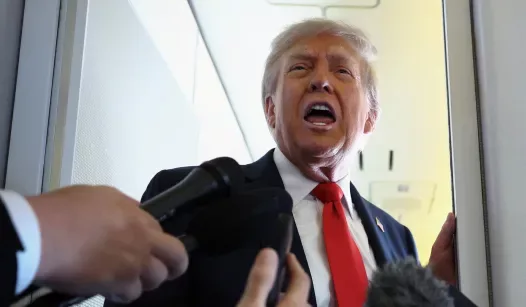In recent years, the term “state capitalism” has gained traction as governments around the world increasingly intervene in their economies. This approach, often characterized by a close relationship between the state and private enterprises, has sparked intense debate about its effectiveness. One prominent figure in this discussion is former President Donald Trump, whose business dealings and political strategies have often blurred the lines between private interests and public policy.
State capitalism, in theory, aims to harness the power of the market while allowing government control to ensure economic stability and growth. However, critics argue that this model is fundamentally flawed and can lead to inefficiencies, corruption, and a lack of innovation. Trump’s approach to business and governance provides a compelling case study of these pitfalls.
During his presidency, Trump frequently touted his background as a successful businessman, using it as a platform to promote his policies. His administration’s economic strategies often reflected a state capitalist approach, with significant government involvement in various sectors. From trade policies to infrastructure projects, Trump’s initiatives often favored certain industries and companies, raising questions about fairness and competition.
One of the most notable examples of Trump’s state capitalist tendencies can be seen in his trade policies. The imposition of tariffs on imported goods was intended to protect American industries and jobs. However, these measures often led to retaliatory actions from other countries, ultimately harming American consumers and businesses. Critics argue that such protectionist policies can stifle competition and innovation, as companies become reliant on government support rather than striving to improve their products and services.
Moreover, Trump’s administration frequently engaged in what some have termed “corporate welfare,” where government resources were directed toward specific businesses or industries. This practice can create an uneven playing field, where some companies thrive due to their connections to the government, while others struggle to compete. The resulting landscape can discourage entrepreneurship and limit opportunities for new entrants into the market.
Another aspect of Trump’s state capitalism is the relationship between politics and private enterprise. The former president’s business interests often intersected with his political decisions, raising ethical concerns about conflicts of interest. For instance, his refusal to divest from his businesses while in office led to accusations of using the presidency to benefit his private ventures. This blurred line between public service and personal profit is a hallmark of state capitalism, where the interests of the state and the private sector become intertwined.
The implications of Trump’s approach extend beyond his presidency. The rise of state capitalism in the U.S. has sparked a broader conversation about the role of government in the economy. As political polarization increases, the debate over the balance between free markets and government intervention continues to evolve. Some argue that a more hands-on approach is necessary to address issues such as income inequality and climate change, while others warn that excessive government involvement can stifle innovation and economic growth.
In examining the consequences of state capitalism, it becomes clear that a careful balance must be struck. While government intervention can play a vital role in addressing market failures and ensuring economic stability, it is essential to maintain a competitive environment that fosters innovation and entrepreneurship. The challenge lies in finding the right mix of policies that encourage growth without compromising the principles of a free market.
As the U.S. navigates its political landscape, the lessons learned from Trump’s business tactics and state capitalist tendencies will remain relevant. Understanding the complexities of this model can help inform future policies and guide the nation toward a more equitable and prosperous economic future. Whether through reforming trade policies, reevaluating corporate subsidies, or ensuring transparency in government-business relationships, the path forward will require thoughtful consideration of the role of the state in the economy.
In conclusion, the discussion around state capitalism and its implications for American politics and business is far from over. As citizens and policymakers reflect on the past, it is crucial to engage in meaningful dialogue about the best way to structure the economy for the benefit of all. By learning from the experiences of the Trump administration and critically examining the concept of state capitalism, the U.S. can work toward a more balanced and effective economic system that promotes growth, innovation, and fairness.
